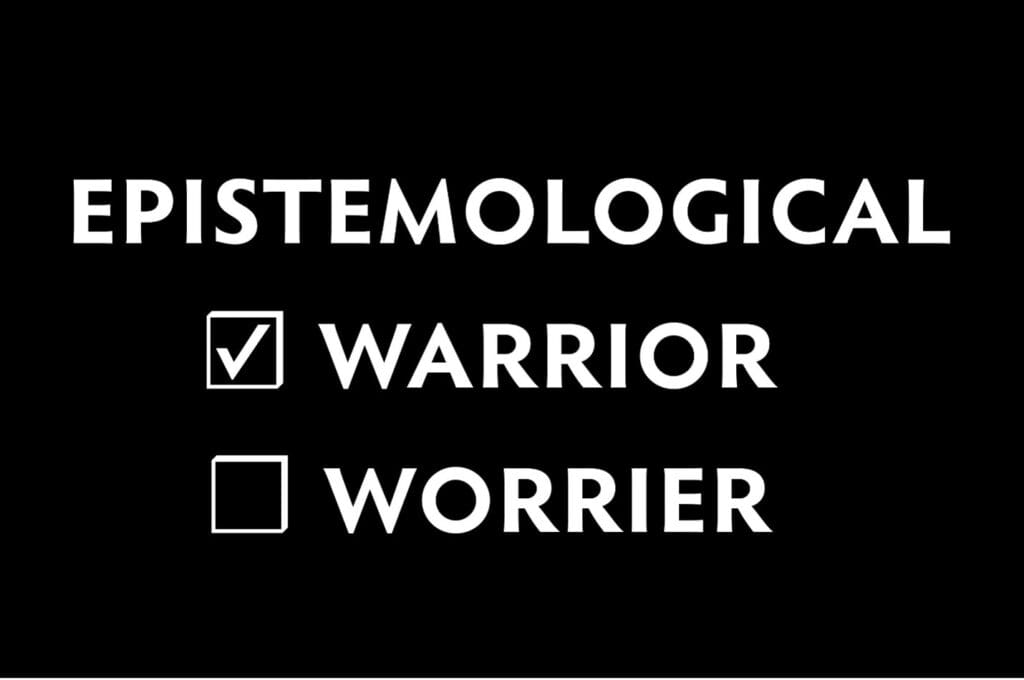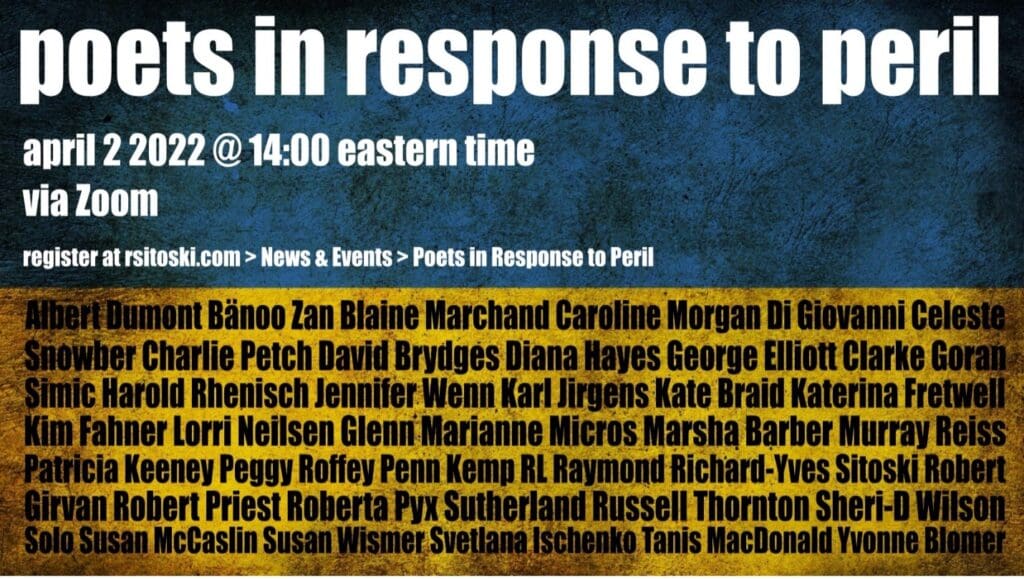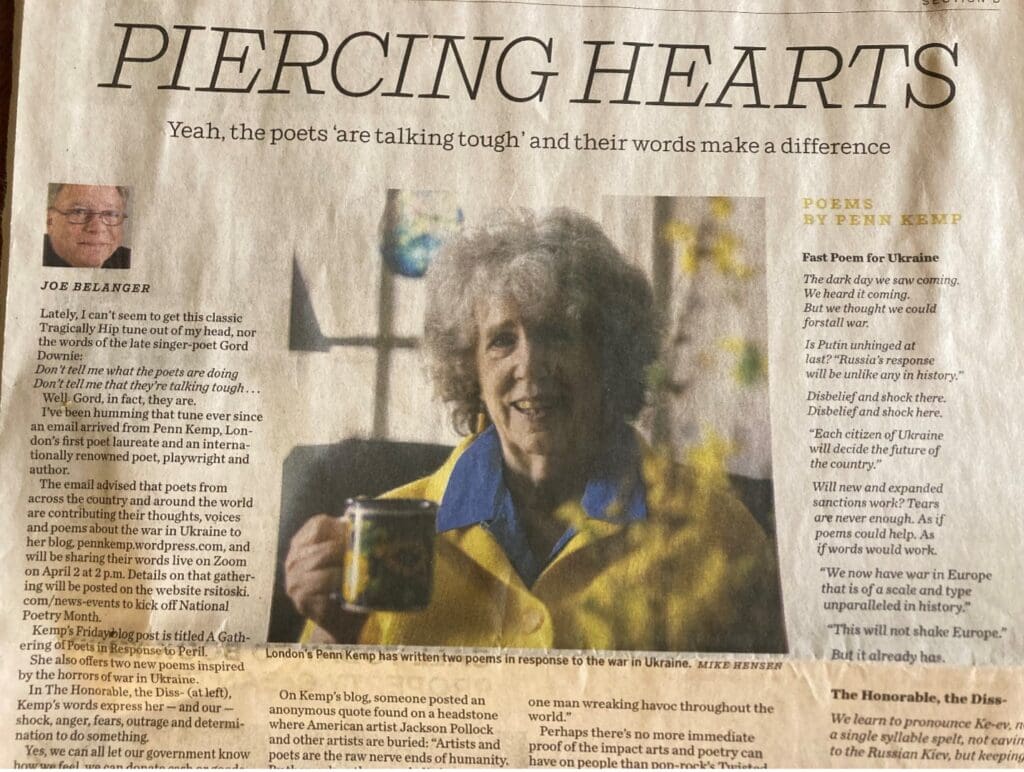A Gathering of Poets in Response to Peril
How do poets respond to precarious events in the world? In his famous elegy for W. B. Yeats, W. H. Auden says, “poetry makes nothing happen.” And he adds: “it survives, / A way of happening, a mouth.”
“On Feb. 24, 2022, when the world woke to the shock of the catastrophic bombing of Ukraine,” poet Susan McCaslin writes, “I asked myself and a few of my fellow poet friends how they would respond to Auden’s words, especially in these perilous times.” Susan and I had discussed this line from Auden and continued with our own reflections on activism through poetry in this “Dialogue: Reflections on W.H. Auden’s ‘Poetry Makes Nothing Happen’”: https://www.inanna.ca/2018/11/29/art-action-transformation/.
When poets replied, I continued curating this project in response to Auden, putting the question to my on-line community. Poets added a line or two for how poetry matters, lines I collected here: https://pennkemp.wordpress.com/2022/02/27/how-poetry-matters-a-gathering-of-poets-in-perilous-times/. I published the blog on March FORTH, the only day of the year that is a command! Here is a sampling from that blog:
How Poems Matter. Why Poems Matter.

“Poetry is the translation of silences into words.” Sadiqa de Meijer
“Poetry makes nothing happen? It does make things happen in terms of epistemology, both as a view on the outside world and one’s internal world.” Gary Barwin
“Poetry makes nothing obvious, nothing earth-shaking happen. At first. But it’s a slow ignition that can light up your life later, on the right day, at the right time, right when you need it most.” Kate Braid
“Auden also wrote, ‘But it survives/ A way of happening, a mouth.’” In perilous times, poetry is hope, and hope is awareness. Hope is clarity.” So writes American activist poet, Carolyn Forché. Carolyn also gave us permission to add this link to a reading on March 1 of “Voices for Ukraine–Words together, Worlds apart.” The title alone speaks the disparity between the intimacy of words spoken together, despite physical separation. The reading inspired this little poem:
Simultaneous Translation
When Ilya Kaminsky thanks
Carolyn Forché for her reading
dedicated to the city of Odessa“where two things were esteemed,
poetry and ships”–in the subtitle
below, his word “reading” appears
aptly as “vineyard”.
The vineyard is a good metaphor for the creative fostering of intimacy through poetry. Such immediacy of response from our poets is an ecology of intimacy in action.
For example, Romanian-born American poet Andrei Codrescu wrote, “Tyrants hate poets: Ovid was exiled by Augustus, Mandelstam was killed by Stalin, Neruda banished by Pinochet, Hikmet imprisoned in Turkey. When I hear the word ‘Putin,’ I reach for my sonnet!”
*
And then the intimacy spread, heart-warming and uplifting. In the ongoing wake of the invasion, I put a further call out for reflections on the war. Poems in Response to Peril: an anthology is the result. In this book, forty-eight stellar Canadian poets offer us more than sixty poems, ways of making things happen. The anthology is dedicated to the poets and peoples of Ukraine from poets in Canada. The poems encompass the entirety of human emotions, written and collected in the white heat of the moment during this horrendous time.
And the press responded: “Yes, the arts, including poetry — words — can have an impact, piercing hearts and minds and the balloons of fools.” Joe Belanger, “Piercing Hearts: poets ‘are talking tough’ and their words make a difference” The London Free Press, March 5, 2022.
As Wislawa Szymborska writes, ‘Poetry isn’t recreation, a respite from life. It is life.’
From FAST POEM for UKRAINE
The dark day we saw
coming. We heard it
coming. But we thought
we could for-
stall war.Disbelief and shock there.
Disbelief and shock here.Will new and expanded
sanctions work? Tears
are never enough. As if
poems could help. As
if words would work.“We now have war in Europe
that is of a scale and type
unparalleled in history.”
“This will not shake Europe.”
But it already has.‘Prove that you are with us. Prove
that you will not let us go,’ demands
President Volodymyr Zelensky of us.”May Kyiv keep safe beneath the holy
mantle of Maty Zemlya, Mother Earth
as if prayers are enough. Send money.
Poems in Response to Peril: An Anthology highlights the work by some of our most committed Canadian poets, responding to the current crisis in Ukraine and other perils afflicting our troubled era.
A community of poets came together to create this anthology, all wanting to express support for Ukraine in the best way they can: words that move hearts. Poems in Response to Peril is 125 pages of poetry that describe a sharing of community, of heart space. Such an outlet for despair helps us—both writer and reader—become activists. The poems encompass the entirety of human emotions, written and published in the white heat of the moment. Poems in Response to Peril will be published in Spring, 2022 by Pendas Productions/Laughing Raven Press. The videos of readings by our contributors will be linked by q.r. code by our indomitable video curator, Richard-Yves Sitoski! The project is ongoing with poets reading poems in response to peril. What could be more intimate?
These passionate, often heartbreaking, poems offer us sunflowers and broken earth; intimacy and grief; falling bombs and the fragility of flesh; AK-47s and a bride’s bouquet. Poems in Response to Peril is a sharing of heart space, an outlet for despair that helps reader and writer to become activists. Such powerful, poignant, essential poems move us “from words to comfort to action”.
We had to move quickly, given the rapidity with which global events transpire to create Poems in Response to Peril, a book in which Canadian poets could express their solidarity with the people of Ukraine, including artists and cultural figures who are toughing it out in their besieged cities: people such as publisher Anetta Antonenko, who, as of this writing, is staying put in Kyiv and posting encouraging messages on social media. CBC’s Radio One Ontario Morning interviewed Richard-Yves Sitoski on April 1: “Some say the pen is mightier than the sword…a group of Canadian poets have been thinking on that line. Over the weekend, dozens will gather to share poems in solidarity with Ukraine.”
But there is always more that can be done, and so the project grew. Richard-Yves Sitoski was brought on board to organize a Poets in Response to Peril Zoom reading, uniting many of this book’s featured poets and recorded on April 2, 2022: see https://www.rsitoski.com/event-details/poets-in-response-to-peril. Being together in real time brought us close, and the response was heartfelt, a true and much-needed intimacy. POETS IN RESPONSE TO PERIL was a profound and poignant event, gathering poets and participants coast to coast— holding fast for over three hours of words that we so needed to hear. Poetry is the ability to respond, and the poets did, in voices eloquently and powerfully expressed. This blog is intended to keep that community vibe flowing: https://pennkemp.wordpress.com/2022/04/03/gathering-voices-in-response-to-peril/.

Richard-Yves is curating an ongoing Poets in Response to Peril playlist of 40 videos provided not only by poets represented in this book, but by many others across Canada. These videos are accessible at YouTube > Poets in Response to Peril, https://www.youtube.com/user/veggiemeister/playlists. Poets who wish to contribute videos are encouraged to contact Richard-Yves at r_sitoski@yahoo.ca. And so the enterprise continues, welcoming more and more poets into the big tent of internet integrity. We can make the web work for an intimate heart connection between poet and community.
It is our belief that poetry can and does make things happen. Richard-Yves writes in our anthology preface, “These things might not happen right away, and they might not be obvious. But poetry can serve as a witness to humanity at its worst, and a celebration of humanity at its best. It provides succor in our direst moments. It provides confirmation that we have been seen, recognized, and understood. And in its sometimes discursive manner, it cuts through the starless night of disinformation like a searchlight.” We are also reaching out directly to Ukraine, at the request of Ukrainian publisher Anetta Antonenko, who asked poets “to inspire and give support”: https://anetta-publishers.com/pages/16. Ukraine is a country where poetry matters.

And yet, and yet, I question. Why spend so much labour editing poems for Ukraine, when there are so many other ongoing and equally, unimaginably, desperate hot spots world-wide? What is my bias? As a child of Cold War fears, I was pushed into action by Putin’s threat of nuclear arms. I was prompted by the immediacy of Russia’s attack, so vividly displayed across our media, and the eloquent courage of the Ukrainian president, Volodymyr Zelensky, staying steadfast in Kyiv. Poetry is also a hiatus, a lift out of the daily round. Just as we support white Ukraine, may we support all activists against tyranny. May we celebrate peace with freedom everywhere.
As poets, what is our responsibility, given the current crises in the world? The ability to respond with all our senses live and attuned to the moment as well as to the universal. In response to Putin’s war, I gathered a shield of beloved poets around me in an embrace of poetry, the intimacy of a poem in the face of The Dreadful. What prompted me was Putin’s threat of nuclear bombs, which would annihilate the world, He’s a madman, one man wreaking havoc throughout the world. That’s why I turn to poetry. It makes nothing happen, but it expands our empathy. In expressing our sorrow or delight, poetry articulates what many are feeling to the wider community; it reaches across languages to the heart. And so I channeled my private grief over my husband’s death into an expression of shock and distress at Russia’s invasion.
Intimacy plays a role in my response. So many Ukrainians have emigrated to Canada over the decades: they are neighbours, grandmothers, friends. And they are European, white, “like us”. Media attention is on the war 24/7, portrayed as a clear-cut play of good against evil that we can understand. We are not getting nearly such intimate coverage of Eritrea, Yemen, Somalia or even Afghanistan. There the issues appear more tribally complicated, more distant and racialized, “other”. Western journalists are not there on the ground, telling the stories of the people as they are in Ukraine and neighbouring NATO states. Our attention is stretched: how much can one heart hold? How much can one heart bear, before shutting down, before cracking? T. S. Eliot claims, “Humankind cannot bear very much reality.” But now we must bear all the reality bearing down on us through the media.
Who or what is this ‘we’ of which I speak? “We” as a term can no longer be limited by race or class or generation, by phenotype or phylum. Intimacy at its deepest means expanding our sense of self, our sense of ‘us”, to include the whole world and all its peoples—animate, inanimate, and beyond. Wider and wider until all is encompassed. The Stoic philiosopher Terence writes, “Homo sum, humani nihil a me alienum puto”, or “I am human, and I think nothing human is alien to me.” May the earth speak her mind through us all and inform us.
Here’s celebrating National Poetry Month with poems that move us to action!
Penn Kemp
For more by Penn Kemp, check out NPM22 Blog: An Ecology of Intimacy: Through the Lens of Poetry by Penn Kemp
Poet, performer and playwright Penn Kemp has been celebrated as a trailblazer since her first publication of poetry by Coach House (1972), a “poetic El Niño”, and a “one-woman literary industry”. Chosen as the League’s Spoken Word Artist (2015) and a Life Member, Kemp has long been a keen participant/activist in Canada’s cultural life, with more than thirty books of poetry, prose and drama; seven plays and ten CDs produced as well as award-winning videopoems. She was London’s inaugural Poet Laureate (2010-13) and Western University’s Writer-in-Residence (2009-10). Her project was the DVD, Luminous Entrance: A Sound Opera for Climate Change Action, performed at Aeolian Hall, London. Her other Sound Operas have been performed there and at venues across Canada. She has been writer-in-residence at universities throughout India and Brazil with her work translated into many languages. Her “poem for peace in many voices”, for instance, is out in 136 languages. A new collection is A NEAR MEMOIR: NEW POEMS from Beliveau Books, Stratford. Her latest collaborate is P.S., a chapbook of poetry with Sharon Thesen, coming out from Gap Riot Press in Spring, 2022: “What does Gap Riot love more than two women in poetic conversation? It’s when those two women are absolute legends in the world of Canadian poetry, two hugely influential and long-invested contributors and caretakers of our field.”
www.gapriotpress.com/archive/penn-kemp-sharon-thesen-ps.
Penn is active on social media and in collaboration with other poets, musicians and theatre artists in an effort to promote community… and poetry.
https://pennkemp.wordpress.com/2022/03/04/a-gathering-of-poets-in-response-to-peril/
https://pennkemp.wordpress.com/2022/03/04/poets-are-talking-tough-and-their-words-make-a-difference/
https://pennkemp.wordpress.com/2022/03/11/couplets-and-cupcakes-for-ukraine/
From words to comfort to action, March 23, 2022, https://www.thelondoner.ca/entertainment/local-arts/london-poet-driving-force-behind-new-anthology-of-poems-about-war-in-ukraine/
https://pennkemp.wordpress.com/2022/02/27/how-poetry-matters-a-gathering-of-poets-in-perilous-times/
